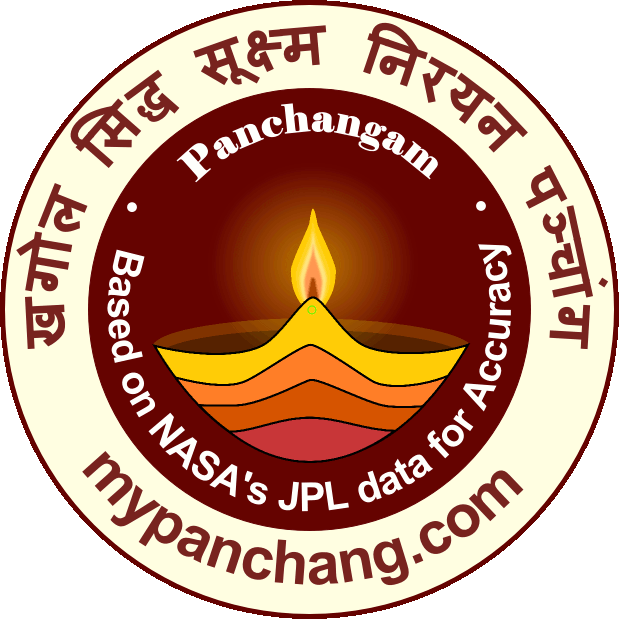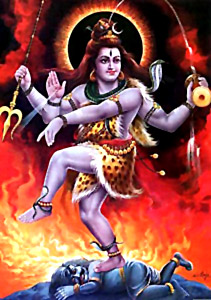

Mahashivaratri dates
for United States
If this is not your location, or want to another location, please select Country, State and type City, otherwise scroll down


If this is not your location, or want to another location, please select Country, State and type City, otherwise scroll down
 Maha Shivaratri | ||||||||||||||||||||||||||||||
| Mahashivaratri Muhurtha | ||
| Important Timings | ||
| Sunset - Next Sunrise | Feb/15 06:09:22 PM | Feb/16 07:20:36 AM |
| Muhurtha | Begin Time | End Time |
| Lingodbhava Time | Feb/16 00:18:37 AM | Feb/16 01:11:22 AM |
| Prahara 1 | Feb/15 06:09:22 PM | Feb/15 09:27:11 PM |
| Prahara 2 | Feb/15 09:27:11 PM | Feb/16 00:44:59 AM |
| Prahara 3 | Feb/16 00:44:59 AM | Feb/16 04:02:48 AM |
| Prahara 4 | Feb/16 04:02:48 AM | Feb/16 07:20:36 AM |
Maha Shivratri is a Hindu festival celebrated every year when chaturdashi tithi in the Krishna Paksha (waning moon) of the month of Maagha (Gujarat, Maharastra and South Indian Amavasyant system) or Phalguna (Purnimant Months system . North India) appears during the midnight which is not 00:00 AM. The midnight as per hindu calendar is (next sunrise . previous sunset)/2. As hindu day is from the sunrise to sunset.
The festival is principally celebrated by offerings of Bael (Bilva) leaves to the Lord Shiva, all day fasting and an all night long vigil. Shivratri (Sanskrit 'ratri' = night) is the night when he is said to have performed the Tandava Nritya or the dance of primordial creation, preservation and destruction. The festival is observed for one day and one night only.
|
प्रभुं प्राणनाथं विभुं विश्वनाथं जगन्नाथनाथं सदानन्दभाजम्। भवद्भव्यभूतेश्वरं भूतनाथं शिवं शङ्करं शम्भुमीशानमीडे॥ १॥ गले रुण्डमालं तनौ सर्पजालं महाकालकालं गणेशाधिपालम्। जटाजूटगङ्गोत्तरङ्गैर्विशालं शिवं शङ्करं शम्भुमीशानमीडे॥ २॥ मुदामाकरं मण्डनं मण्डयन्तं महामण्डलं भस्मभूषधरंतम्। अनादिह्यपारं महामोहहारं शिवं शङ्करं शम्भुमीशानमीडे॥ ३॥ वटाधोनिवासं महाट्टाट्टहासं महापापनाशं सदासुप्रकाशम्। गिरीशं गणेशं महेशं सुरेशं शिवं शङ्करं शम्भुमीशानमीडे॥ ४॥ गिरिन्द्रात्मजासंग्रहीतार्धदेहं गिरौ संस्थितं सर्वदा सन्नगेहम्। परब्रह्मब्रह्मादिभिर्वन्ध्यमानं शिवं शङ्करं शम्भुमीशानमीडे॥ ५॥ कपालं त्रिशूलं कराभ्यां दधानं पदाम्भोजनम्राय कामं ददानम्। बलीवर्दयानं सुराणां प्रधानं शिवं शङ्करं शम्भुमीशानमीडे॥ ६॥ शरच्चन्द्रगात्रं गुणानन्द पात्रं त्रिनेत्रं पवित्रं धनेशस्य मित्रम्। अपर्णाकलत्रं चरित्रं विचित्रं शिवं शङ्करं शम्भुमीशानमीडे॥ ७॥ हरं सर्पहारं चिता भूविहारं भवं वेदसारं सदा निर्विकारम्। श्मशाने वदन्तं मनोजं दहन्तं शिवं शङ्करं शम्भुमीशानमीडे॥ ८॥ स्तवं यः प्रभाते नरः शूलपाणे पठेत् सर्वदा भर्गभावानुरक्तः। स पुत्रं धनं धान्यमित्रं कलत्रं विचित्रं समासाद्य मोक्षं प्रयाति॥ ९॥ |
prabhuṁ prāṇanāthaṁ vibhuṁ viśvanāthaṁ jagannāthanāthaṁ sadānandabhājam | bhavadbhavyabhūteśvaraṁ bhūtanāthaṁ śivaṁ śaṅkaraṁ śambhumīśānamīḍe || 1|| gale ruṇḍamālaṁ tanau sarpajālaṁ mahākālakālaṁ gaṇeśādhipālam | jaṭājūṭagaṅgottaraṅgairviśālaṁ śivaṁ śaṅkaraṁ śambhumīśānamīḍe || 2|| mudāmākaraṁ maṇḍanaṁ maṇḍayantaṁ mahāmaṇḍalaṁ bhasmabhūṣadharaṁtam | anādihyapāraṁ mahāmohahāraṁ śivaṁ śaṅkaraṁ śambhumīśānamīḍe || 3|| vaṭādhonivāsaṁ mahāṭṭāṭṭahāsaṁ mahāpāpanāśaṁ sadāsuprakāśam | girīśaṁ gaṇeśaṁ maheśaṁ sureśaṁ śivaṁ śaṅkaraṁ śambhumīśānamīḍe || 4|| girindrātmajāsaṁgrahītārdhadehaṁ girau saṁsthitaṁ sarvadā sannageham | parabrahmabrahmādibhirvandhyamānaṁ śivaṁ śaṅkaraṁ śambhumīśānamīḍe || 5|| kapālaṁ triśūlaṁ karābhyāṁ dadhānaṁ padāmbhojanamrāya kāmaṁ dadānam | balīvardayānaṁ surāṇāṁ pradhānaṁ śivaṁ śaṅkaraṁ śambhumīśānamīḍe || 6|| śaraccandragātraṁ guṇānanda pātraṁ trinetraṁ pavitraṁ dhaneśasya mitram | aparṇākalatraṁ caritraṁ vicitraṁ śivaṁ śaṅkaraṁ śambhumīśānamīḍe || 7|| haraṁ sarpahāraṁ citā bhūvihāraṁ bhavaṁ vedasāraṁ sadā nirvikāram | śmaśāne vadantaṁ manojaṁ dahantaṁ śivaṁ śaṅkaraṁ śambhumīśānamīḍe || 8|| stavaṁ yaḥ prabhāte naraḥ śūlapāṇe paṭhet sarvadā bhargabhāvānuraktaḥ | sa putraṁ dhanaṁ dhānyamitraṁ kalatraṁ vicitraṁ samāsādya mokṣaṁ prayāti || 9|| |
Shiva Mahimna Stotra
महिम्नः पारं ते परमविदुषो यद्यसदृशी
स्तुतिर्ब्रह्मादीनामपि तदवसन्नास्त्वयि गिरः ।
अथाऽवाच्यः सर्वः स्वमतिपरिणामावधि गृणन्
ममाप्येष स्तोत्रे हर निरपवादः परिकरः॥ १॥
अतीतः पंथानं तव च महिमा वाङ्मनसयोर्
अतद्व्यावृत्त्या यं चकितमभिधत्ते श्रुतिरपि।
स कस्य स्तोतव्यः कतिविधगुणः कस्य विषयः
पदे त्वर्वाचीने पतति न मनः कस्य न वचः॥ २॥
मधुस्फीता वाचः परमममृतं निर्मितवतः
तव ब्रह्मन् किं वाग् अपि सुरगुरोर्विस्मयपदम्।
मम त्वेतां वाणीं गुणकथनपुण्येन भवतः
पुनामीत्यर्थेऽस्मिन् पुरमथन बुद्धिर्व्यवसिता॥ ३॥
तवैश्वर्यं यत् त्त ज्जगदुदयरक्षाप्रलयकृत्
त्रयीवस्तु व्यस्तं तिस्रुषु गुणभिन्नासु तनुषु।
अभव्यानामस्मिन् वरद रमणीयामरमणीं
विहन्तुं व्याक्रोशीं विदधत इहैके जडधियः॥ ४॥
किमीहः किंकायः स खलु किमुपायस्त्रिभुवनं
किमाधारो धाता सृजति किमुपादान इति च।
अतर्क्यैश्वर्येत्वयि अनवसर दुःस्थो हतधियः
कुतर्कोऽयं कांश्चित् मुखरयति मोहाय जगतः॥ ५॥
अजन्मानो लोकाः किमवयववन्तोऽपि जगतां
अधिष्ठातारं किं भवविधिरनादृत्य भवति।
अनीशो वा कुर्याद् भुवनजनने कः परिकरो
यतो मन्दास्त्वांप्रति अमरवर संशेरत इमे॥ ६॥
त्रयी साङ्ख्यं योगः पशुपतिमतं वैष्णवमिति
प्रभिन्ने प्रस्थाने परमिदमदः पथ्यमिति च।
रुचीनां वैचित्र्यात् ऋजुकुटिल नानापथजुषां
नृणामेको गम्यस्त्वमसि पयसामर्णव इव॥ ७॥
महोक्षः खट्वाङ्गं परशुरजिनं भस्म फणिनः
कपालं चेतीयत्तव वरद तन्त्रोपकरणम्।
सुरास्तां तामृद्धिं दधति तु भवद् भ्रूप्रणिहितां
न हि स्वात्मारामं विषयमृगतृष्णा भ्रमयति॥ ८॥
ध्रुवं कश्चित् सर्वं सकलमपरस्त्वध्रुवमिदं
परो ध्रौव्याऽध्रौव्ये जगति गदति व्यस्तविषये।
समस्तेऽप्येतस्मिन् पुरमथन तैर्विस्मित इव
स्तुवन् जिह्रेमि त्वां न खलु ननु धृष्टा मुखरता॥ ९॥
तवैश्वर्यं यत्नात् यदुपरि विरिञ्चिर्हरिरधः
परिच्छेतुं याता-वनल-मनल-स्कन्धवपुषः।
ततो भक्तिश्रद्धा-भरगुरु-गृणद्भ्यां गिरिश यत्
स्वयं तस्थे ताभ्यां तव किमनुवृत्तिर्न फलति॥ १०॥
अयत्नादापाद्य त्रिभुवनमवैरव्यतिकरं
दशास्यो यद्बाहून् अमृत रणकण्डू-परवशान्।
शिरःपद्मश्रेणी-रचितचरणाम्भोरुह-बलेः
स्थिरायास्त्वद्भक्तेस् त्रिपुरहर विस्फूर्जितमिदम्॥ ११॥
अमुष्य त्वत्सेवा-समधिगतसारं भुजवनं
बलात् कैलासेऽपि त्वदधिवसतौ विक्रमयतः।
अलभ्या पातालेऽप्यलसचलितांगुष्ठशिरसि
प्रतिष्ठा त्वय्यासीद् ध्रुवमुपचितो मुह्यति खलः॥ १२॥
यदृद्धिं सुत्राम्णो वरद परमोच्चैरपि सतीं
अधश्चक्रे बाणः परिजनविधेयस्-त्रिभुवनः।
न तच्चित्रं तस्मिन् वरिवसितरि त्वच्चरणयोर्
न कस्याप्युन्नत्यै भवति शिर-सस्त्व-य्यवनतिः॥ १३॥
अकाण्ड-ब्रह्माण्ड-क्षयचकित-देवासुरकृपा
विधेयस्याऽऽसीद्यस् त्रिनयन विषं संहृतवतः।
स कल्माषः कण्ठे तव न कुरुते न श्रियमहो
विकारोऽपि श्लाघ्यो भुवन-भय- भङ्ग- व्यसनिनः॥ १४॥
असिद्धार्था नैव क्वचिदपि सदेवासुरनरे
निवर्तन्ते नित्यं जगति जयिनो यस्य विशिखाः।
स पश्यन्नीश त्वाम् इतरसुर-साधारणमभूत्
स्मरः स्मर्तव्यात्मा न हि वशिषु पथ्यः परिभवः॥ १५॥
मही पादाघाताद् व्रजति सहसा संशयपदं
पदं विष्णोर्भ्राम्यद् भुज-परिघ-रुग्ण-ग्रह- गणम्।
मुहुर्द्यौर्दौस्थ्यं यात्यनिभृत-जटा-ताडित-तटा
जगद्रक्षायै त्वं नटसि ननु वामैव विभुता॥ १६॥
वियद्व्यापी तारा-गण-गुणित-फेनोद्गम-रुचिः
प्रवाहो वारां यः पृषतलघुदृष्टश् शिरसि ते।
जगद् द्द्वीपाकारं जलधिवलयं तेन कृतमिति
अनेनैवोन्नेयं धृतमहिम दिव्यं तव वपुः॥ १७॥
रथः क्षोणी यन्ता शतधृतिरगेन्द्रो धनुरथो
रथाङ्गे चन्द्रार्कौ रथ-चरण-पाणिः शर इति।
दिधक्षोस्ते कोऽयं त्रिपुर-तृणमाडम्बर-विधिः
विधेयैः क्रीडन्त्यो न खलु परतन्त्राः प्रभुधियः॥ १८॥
हरिस्ते साहस्रं कमल बलिमाधाय पदयोर्
यदेकोने तस्मिन् निजमुदहरन्नेत्रकमलम्।
गतो भक्त्युद्रेकः परिणतिमसौ चक्रवपुषा
त्रयाणां रक्षायै त्रिपुरहर जागर्ति जगताम्॥ १९॥
क्रतौ सुप्ते जाग्रत् त्वमसि फलयोगे क्रतुमतां
क्व कर्म प्रध्वस्तं फलति पुरुषाराधनमृते।
अतस्त्वां सम्प्रेक्ष्य क्रतुषु फलदान-प्रतिभुवं
श्रुतौ श्रद्धां बध्वा कृतपरिकरः कर्मसु जनः॥ २०॥
क्रियादक्षो दक्षः क्रतुपतिरधीशस्तनुभृतां
ऋषीणामार्त्विज्यं शरणद सदस्याः सुर-गणाः।
क्रतुभ्रेषस्त्वत्तः क्रतुफल-विधान-व्यसनिनो
ध्रुवं कर्तुः श्रद्धा-विधुरमभिचाराय हि मखाः॥ २१॥
प्रजानाथं नाथ प्रसभमभिकं स्वां दुहितरं
गतं रोहिद् भूतां रिरमयिषुमृष्यस्य वपुषा।
धनुष्पाणेर्यातं दिवमपि सपत्राकृतममुं
त्रसन्तं तेऽद्यापि त्यजति न मृगव्याधरभसः॥ २२॥
स्वलावण्याशंसा धृतधनुषमह्नाय तृणवत्
पुरः प्लुष्टं दृष्ट्वा पुरमथन पुष्पायुधमपि।
यदि स्त्रैणं देवी यमनिरत-देहार्ध-घटनात्
अवैति त्वामद्धा बत वरद मुग्धा युवतयः॥ २३॥
श्मशानेष्वाक्रीडा स्मरहर पिशाचास्सहचरास्
चिता-भस्मालेप-स्स्रगपि नृकरोटी-परिकरः।
अमङ्गल्यं शीलं तव भवतु नामैवमखिलं
तथापि स्मर्तॄणां वरद परमं मङ्गलमसि॥ २४॥
मनः प्रत्यक्चित्ते सविधमविधायात्त-मरुतः
प्रहृष्यद्रोमाणः प्रमद-सलिलोत्सङ्गति-दृशः।
यदालोक्याह्लादं ह्रद इव निमज्यामृतमये
दधत्यन्तस्तत्त्वं किमपि यमिनस्तत् किल भवान्॥ २५॥
त्वमर्कस्त्वं सोमस्त्वमसि पवनस्त्वं हुतवहस्
त्वमापस्त्वं व्योम त्वमु धरणिरात्मा त्वमिति च।
परिच्छिन्नामेवं त्वयि परिणता बिभ्रतु गिरं
न विद्मस्तत्तत्त्वं वयमिह तु यत्त्वं न भवसि॥ २६॥
त्रयीं तिस्रो वृत्तीस्त्रिभुवनमथो त्रीनपि सुरान्
अकाराद्यै वर्णेस् त्रिभिरभिद-धत्तीर्ण विकृति।
तुरीयं ते धाम ध्वनिभिरवरुन्धानमणुभिः
समस्तं व्यस्तं त्वां शरणद गृणात्योमिति पदम्॥ २७॥
भवः शर्वो रुद्रः पशुपतिरथोग्रः सहमहान्
तथा भीमेशानौ इति यदभिधानाष्टकमिदम्।
अमुष्मिन् प्रत्येकं प्रविचरति देव श्रुतिरपि
प्रियायास्मै धाम्ने प्रणिहित-नमस्योऽस्मि भवते॥ २८॥
नमो नेदिष्ठाय प्रियदव दविष्ठाय च नमो
नमः क्षोदिष्ठाय स्मरहर महिष्ठाय च नमः।
नमो वर्षिष्ठाय त्रिनयन यविष्ठाय च नमो
नमः सर्वस्मै ते तदिदमति सर्वाय च नमः॥ २९॥
बहल-रजसे विश्वोत्पत्तौ भवाय नमो नमः
प्रबल-तमसे तत् संहारे हराय नमो नमः।
जन-सुखकृते सत्त्वोद्रिक्तौ मृडाय नमो नमः
प्रमहसि पदे निस्त्रैगुण्ये शिवाय नमो नमः॥ ३०॥
कृश-परिणति-चेतः क्लेशवश्यं क्व चेदं
क्व च तव गुण-सीमो-ल्लङ्घिनी शश्वदृद्धिः।
इति चकितममन्दीकृत्य मां भक्तिराधाद्
वरद चरणयोस्ते वाक्य-पुष्पोपहारम्॥ ३१॥
असित-गिरि-समं स्यात् कज्जलं सिन्धु-पात्रे
सुर-तरुवर-शाखा लेखनी पत्रमुर्वी।
लिखति यदि गृहीत्वा शारदा सर्वकालं
तदपि तव गुणानां ईश पारं न याति॥ ३२॥
असुर-सुर-मुनीन्द्रैर् अर्चितस्येन्दु-मौलेर्
ग्रथित-गुणमहिम्नो निर्गुणस्येश्वरस्य।
सकल-गण-वरिष्ठः पुष्पदन्ताभिधानो
रुचिरमलघुवृत्तैः स्तोत्रमेतच्चकार॥ ३३॥
अहरहरनवद्यं धूर्जटेः स्तोत्रमेतत्
पठति परमभक्त्या शुद्ध-चित्तः पुमान्यः।
स भवति शिवलोके रुद्रतुल्यस्तथाऽत्र
प्रचुरतर-धनायुः पुत्रवान् कीर्तिमांश्च॥ ३४॥
महेशान्नापरो देवो महिम्नो नापरा स्तुतिः।
अघोरान्नापरो मन्त्रो नास्ति तत्त्वं गुरोः परम्॥ ३५॥
दीक्षा दानं तपस्तीर्थं ज्ञानं यागादिकाः क्रियाः।
महिम्नस्तव पाठस्य कलां नार्हन्ति षोडशीम्॥ ३६॥
कुसुमदशन-नामा सर्व-गन्धर्व-राजः
शशिधरवरमौलेर् देवदेवस्य दासः।
स खलु निजमहिम्नो भ्रष्ट एवास्य रोषात्
स्तवनमिदमकार्षीद् दिव्य-दिव्यं महिम्नः॥ ३७॥
सुरगुरुमभिपूज्य स्वर्ग-मोक्षैक-हेतुं
पठति यदि मनुष्यः प्राञ्जलिर्नान्य-चेताः।
व्रजति शिव-समीपं किन्नरैः स्तूयमानः
स्तवनमिदममोघं पुष्पदन्तप्रणीतम्॥ ३८॥
आसमाप्तमिदं स्तोत्रं पुण्यं गन्धर्व-भाषितम्।
अनौपम्यं मनोहारि शिवमीश्वरवर्णनम्॥ ३९॥
इत्येषा वाङ्मयी पूजा श्रीमद्-शंकर-पादयोः।
अर्पिता तेन देवेशः प्रीयतां मे सदाशिवः॥ ४०॥
तव तत्त्वं न जानामि कीदृशोऽसि महेश्वर।
यादृशोऽसि महादेव तादृशाय नमो नमः॥ ४१॥
एककालं द्विकालं वा त्रिकालं यः पठेन्नरः।
सर्वपाप-विनिर्मुक्तः शिव लोके महीयते॥ ४२॥
श्री पुष्पदन्त-मुख-पङ्कज-निर्गतेन
स्तोत्रेण किल्बिष-हरेण हर-प्रियेण।
कण्ठस्थितेन पठितेन समाहितेन
सुप्रीणितो भवति भूतपतिर्महेशः॥ ४३॥